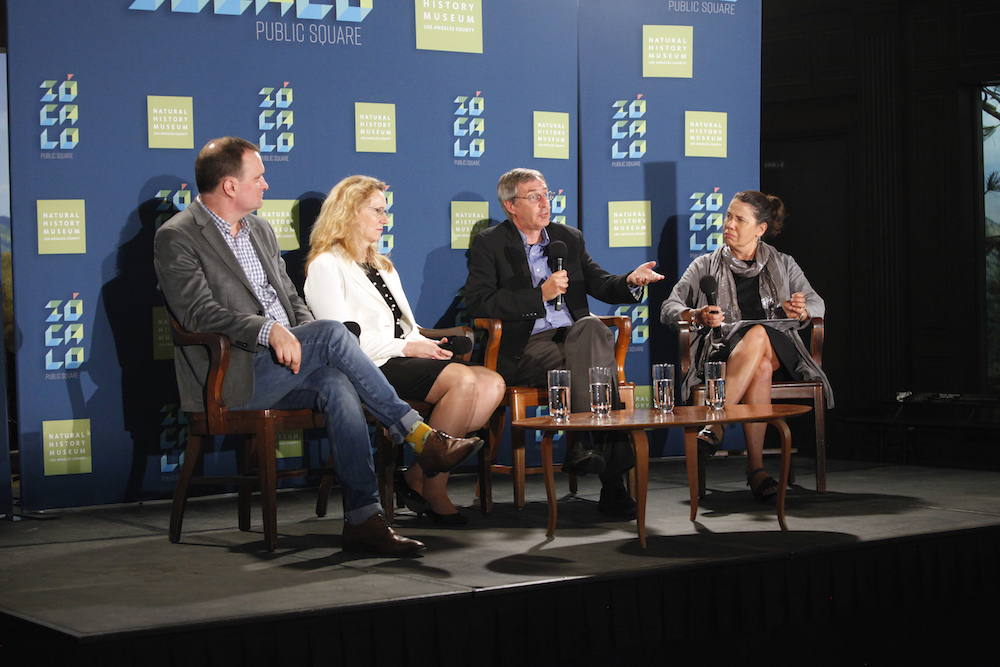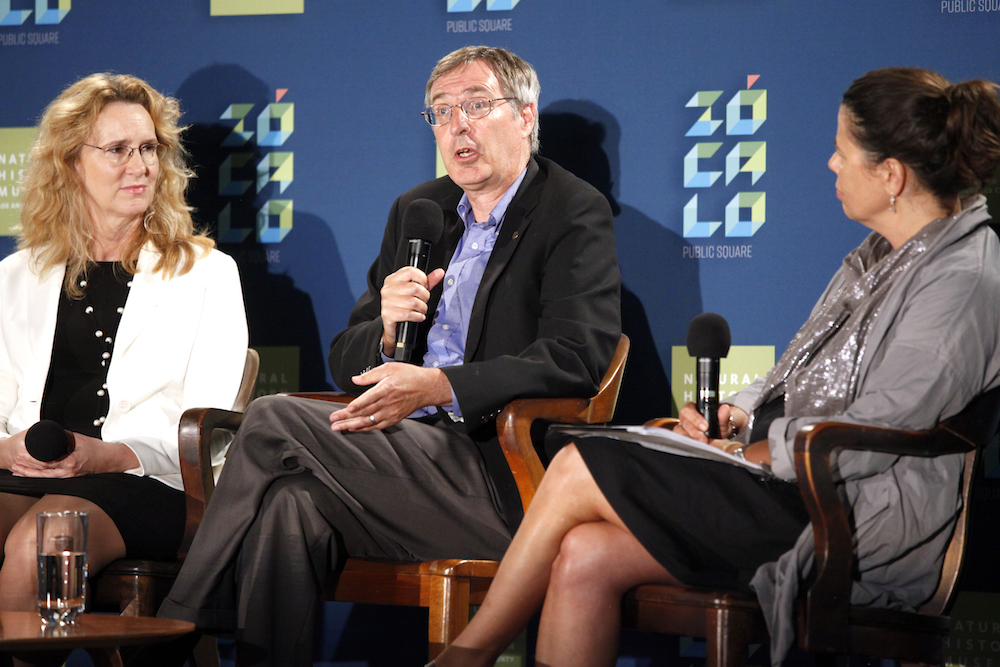
Photo by Aaron Salcido.
Fifty years ago, on July 20, 1969, Neil Armstrong and Buzz Aldrin landed the Apollo Lunar Module and became the first humans to walk on the moon.
It was this achievement—two Earthlings leaving their tiny white shuttle and making their first tentative lunar steps—that moderator Usha Lee McFarling, a Pulitzer Prize-winning science journalist, evoked to begin a Zócalo/Natural History Museum of Los Angeles County event titled “Are Americans Turning Against Science?”
“You get the sense,” McFarling said before a standing-room only crowd at the Natural History Museum in Exposition Park, “that everyone loved Apollo, and everyone loved space, and everyone loved science in the ‘60s.” Did something change?
Caltech historian of science Erik Conway, co-author of Merchants of Doubt, cautioned that the Apollo landing is viewed through the “lens of nostalgia.” Public mistrust of science dogged even the celebrated effort to put Americans on the moon.
“During the actual Apollo years in the ‘60s, the general public opposed it” because of its enormous costs, he said. The mission didn’t reach a majority approval in polls until six months before the launch. It has since been “rebranded as a success,” Conway said.
Conway pointed to a 2012 study that used data from 1974 to 2012 to show how levels of suspicion of science have either increased or decreased along political lines over the decades. In 1974, the people who were most skeptical of science were political moderates, and the suspicion levels of liberals and conservatives were basically the same. But over the past four decades, liberals have maintained the same level of trust in science, even as conservatives’ trust in science has plummeted, Conway said.
The mistrust of science is not new, said UCLA sociologist Jeffrey Guhin. He said that the roots of today’s suspicion of science lie in the Second Great Awakening in the United States, during the early 19th century. The objections then were not to science; instead, some ministers became suspicious of so-called elite ministers who they felt were telling them how to read and interpret the Bible. So a backlash developed against the expertise not just of ministers, but also of lawyers, government officials, and medical doctors, Guhin said.
Guhin added that the American idea of equality can have a dangerous effect when it’s used to insist on an intellectual equality. The notion of expertise being suspicious, Guhin said, is “a very old American sensibility.”
Cary Funk, director of science and society research at Pew Research Center, said that today there is a “mixed pattern” among Americans when it comes to trust. When you ask most Americans about science, “they see positive benefits coming from science on the whole,” Funk said, and they express “continued optimism” regarding future scientific developments. Less than half the population has a strong distrust in science, and confidence in scientists and leaders of the scientific community has been more or less stable over time. However, we are living in an era with lower trust in institutions, particularly government, Funk said.
Political divides emerge when scientific issues become policy issues that would require significant government response, Funk said. For example, there is a wide political divide on climate change. Democrats and Republicans take “totally different positions,” on “pretty much any question that you ask related to climate, energy, and environmental issues.” However, issues like vaccines and GMOs are not subject to the same political divides, in large part because these issues are not associated with policy issues and thus don’t require the involvement of the government, she said.
Funk said that the ways in which we form attitudes and beliefs are complicated. “There’s often an assumption,” she said, “that if we inform you more, you will hold a particular belief, but it just doesn’t work that way.” When people feel that scientists and others are trying to tell them what to believe, people often rebel. This is true especially if this belief is tied to their identity, Guhin said. “If something is important for your identity, you don’t want to change your mind,” he said.
Does this skepticism about science affect how humans may react to new scientific discoveries, like gene editing, which promises to add to the power of humans? Funk replied that the purpose of the new discovery or technology matters as people grapple with new ethical dilemmas presented by science. If people can see and understand the human value for pursuing a particular new development—say “developing animal cells for human organs,” Funk said—they are more likely to support it.
People are not only divided along political lines, but also along religious ones. Guhin has conducted ethnographic research in both evangelical Christian and Muslim high schools where creationism—the belief that a god created the Earth and all living things that inhabit it from nothing—is taught. At these schools, he has found that “people are very comfortable talking about science and in fact they believed that ‘science proved evolution wrong.’”
Indeed, the students at the schools Guhin have studied used science to make their case when they could have just pointed to the Bible to defend their claims.





Send A Letter To the Editors